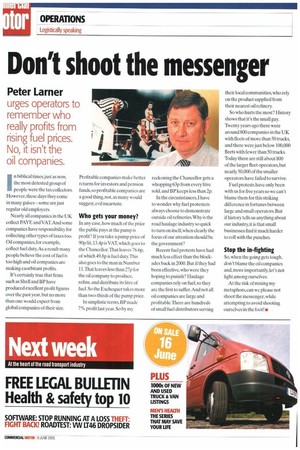Don't shoot the messenger
Page 68

If you've noticed an error in this article please click here to report it so we can fix it.
Peter Lamer urges operators to remember who really profits from rising fuel prices.
No, it isn't the oil companies.
In biblical times, just as no the most detested group of people were the tax collectors. However, these days they come in many guises — some are just regular old employers.
Nearly all companies in the UK collect PAYE and VAT. And some companies have responsibility for collecting other types of taxes too. Oil companies, for example, collect fuel duty. As a result many people believe the cost of fuel is too high and oil companies are making exorbitant profits.
It's certainly true that firms such as Shell and BP have produced excellent profit figures over the past year,but no more than one would expect from global companies of their size. Profitable companies make better returns for investors and pension funds, so profitable companies are a good thing, not, as many would suggest. evil incarnate.
Who gets your money?
In any case, how much of the price the public pays at the pump is profit? If you take a pump price of 90p/lit,13.4p is VAT, which goes to the Chancellor. That leaves 76.6p, of which 49.8p is fuel dutyThis also goes to the man in Number 11.That leaves less than 27p for the oil company to produce, refine, and distribute its litre of fuel. So the Exchequer takes more than two-thirds of the pump price.
In simplistic terms, BP made 7% profit last year. So by my reckoning the Chancellor gets a whopping 63p from every litre sold. and BP keeps less than 2p.
In the circumstances, I have to wonder why fuel protesters always choose to demonstrate outside oil refineries. Why is the road haulage industry so quick to turn on itself, when clearly the focus of our attention should be the government?
Recent fuel protests have had much less effect than the blockades back in 2000. But if they had been effective, who were they hoping to punish? Haulage companies rely on fuel, so they are the first to suffer.And not all oil companies are large and profitable.There are hundreds of small fuel distributors serving their local communities, who rely on the product supplied from their nearest oil refinery.
So who hurts the most? History shows that it's the small guy. Twenty years ago there were around 800 companies in the UK with fleets of more than 50 trucks, and there were just below 100,000 fleets with fewer than 50 trucks. Today there are still about 800 of the larger fleet operators, but nearly 50,000 of the smaller operators have failed to survive.
Fuel protests have only been with us for five years so we can't blame them for this striking difference in fortunes between large and small operators. But if history tells us anything about our industry, it is that small businesses find it much harder to roll with the punches.
Stop the in-fighting
So. when the going gets tough, don't blame the oil companies and, more importantly, let's not fight among ourselves.
At the risk of mixing my metaphors, can we please not shoot the messenger, while attempting to avoid shooting ourselves in the foot!






































































































































































































